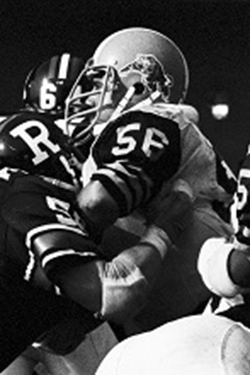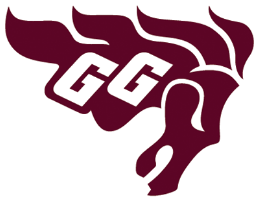
-
- Year:
- 1972-1975
-
- Category:
- Athlete
-
- Inducted:
- 2018
Bio
Al Moffat was a shining star on the Gee-Gees defensive line from 1972-75. A starter in his first year, Moffat proved to be a reliable and durable threat for the powerhouse Gee-Gees. He was named an OUAA All-Star in 1972 and was a key performer on the 1975 Vanier Cup winning team.
Moffat went on to play seven years in the CFL with the Hamilton Tiger-Cats. He was nominated for the 1976 CFL Most Outstanding Rookie award, and appeared in the 1980 Grey Cup after switching to the offensive line.
Al is a member of the Ottawa Sports Hall of Fame and was also inducted into the Brantford & Area Sports Hall of Recognition, in the inaugural class.
*
Al Moffat was a gifted multi-sport athlete who excelled as a defensive lineman with the Gee-Gees before proving his versatility once again by switching to the offensive line mid-way through his seven-year CFL career. Growing up in Brantford, Ont., where he has been inducted into the City’s Sports Hall of Recognition, Moffat was a standout in hockey, baseball, shot put and discuss. He won Ontario championships in athletics and was scouted by numerous professional baseball teams after proving his power with home run crowns. On the gridiron for Brantford Collegiate Institute he was a four-time CWOSSA champion.
The States came calling for “Big Al”, but the self-proclaimed happy-go-lucky all-star felt that going south would result in an extra level of meanness being expected of his six-foot-five, 265-pound frame. That was a common assumption that a young Moffat encountered.
“In grade 13 the other schools in Brantford tried to ban me from competition because they were scared a player may get hurt as I was bigger and faster than anyone in the league. My picture was always in the newspapers around the area with me the biggest player standing next to their biggest or smallest,” remembers Moffat. “My coach told the school board that it was not fair because I was an athlete and not a thug or a bully and I played the game by the rules.”
Bob O’Billovich had sent Moffat a letter in 1970, and fellow Brantfordian Ted Evanetz had found success at uOttawa from 1967-1970. But the deal was clinched when Gee-Gees alum Pierre Benoit invited Moffat’s father to enjoy a cigar in the Mayor’s office at Ottawa City Hall. From there, Moffat was mentored by Jim Cain and Bill Siekerski, ex-pros who instilled a sense that they knew how to handle every situation and also provided the technical knowledge which would take Moffat to the pros himself.
“I was a stay-at-home tackle,” explains Moffat. “Most teams would run to the right so that’s where they put me, to take on the double-teams. I always played better than the guy across from me – I had a big heart.”
Moffat does remember some trick formations that defensive coordinator Jim Conroy would devise, including one against Tuffy Knight’s Waterloo Lutheran offense which featured just one down lineman. “Everyone else stood up – and Waterloo didn’t know what to do! No matter what the formation, everyone had a job, everyone had an assignment. That’s what made us successful.”
“The highest compliment you can pay an athlete is that he is consistent in his performance. That was Al - consistent in every way,” notes Don Gilbert, the head coach from 1971-75 whom Moffat acknowledges as a father-figure as well.
“Don always made us laugh. He was very serious about the game, but he brought humour. My locker was beside where the projector would plug in and sometimes it would fall out of the socket and I’d have to bend down and rummage around in the dark to get it back up. The guys would yell out – ‘hey Big Al what do you got down there, a pizza?’ I had a great time playing at uOttawa.”
Helping Ottawa to a 4-2 season in 1972, Moffat was named an OUAA All-Star in his rookie season. Then, he was part of the teams that would grind their way through 7-1 and 6-1 campaigns with playoff disappointments before reaching the pinnacle in 1975.
In the 1975 championship against Calgary, Moffat is heralded as providing one of his best performances. The Gee-Gees defence stood tall in the 14-9 victory, limiting the Dinos to 109 yards on the ground, picking off three interceptions and forcing one fumble.
Scouted by Frank Morris, Moffat was drafted by Edmonton in the first round of the 1976 CFL Draft. “I worked out hard, getting my bench press up to 415 pounds and my forty-yard dash at 4.9 seconds at 265 pounds,” recalls Moffat. After a pair of exhibition games, the rookie was traded to Hamilton.
“Bob Shaw told me he was elated to have me in his dressing room and the deal with me was that I was talented and played to the level of the competition across from me. I played my best in the games that meant something he said if that was the case then I would excel in the CFL.” The Hamilton Tiger-Cats selected Moffat as team Rookie of the Year for 1976, a season which saw the black and yellow reached the Eastern Final.
In 1977, Moffat began learning the finer points of the offensive line as a backup guard. By 1980, he was the Eastern Conference All-Star at the position and the Tiger-Cats appeared in the Grey Cup. “As a team we had a tough game, but I made it a long day for York Henshal and David Fennell as York was the player the Eskimos traded me away for,” notes Moffat of the Grey Cup game.
His pro career ended during the 1982 season, as injuries began to mount. Moffat returned to Ottawa to work as a Child Youth Counsellor in a therapeutic group home for teen boys. He also met his wife, Nikki Waite, and the pair welcomed a daughter, Arielle Skye, in 1994.
He has coached high school football at Ashbury College, and junior football with the Sooners, Myers Riders, and Nepean Raiders. “I taught the fundamentals – it’s such an important part of today’s game for the safety of the players. We did not fully understand the implications of concussions and the side effects of using your head basically on every play and in practice when I played,” says Moffat who has been open about his anxiety and depression post-career and has been involved in several case studies to better understand the health of former players.
Moving back to Ottawa has also allowed Moffat to remain close to his Gee-Gees teammates.
“That garnet and grey, that horse… it’s been a love affair ever since – the camaraderie is totally different than in the pros,” says Moffat who has spearheaded monthly meet-ups of alumni for lunches at the University Tavern restaurant. Some of the staff members will attend the Touchdown Dinner to help honour Big Al. “It’s like a time warp going in there. All of a sudden, you’re back in the seventies. Whatever time I get to spend with my team mates is important.”
“We always had great speakers at our Touchdown Dinners,” remembers Moffat who played with this year’s keynote speaker, Tom Clements, in Hamilton. “There was one year that the speaker emphasized that as athletes we don’t tell the people that we care about enough that we love them. On our team now we always sign off our notes ‘with love’.
